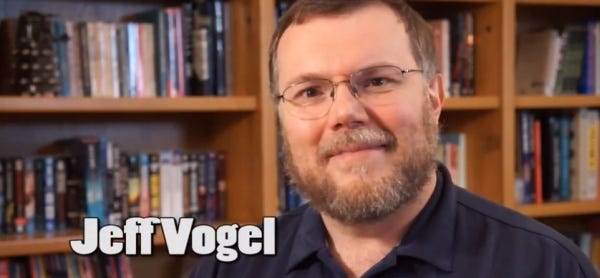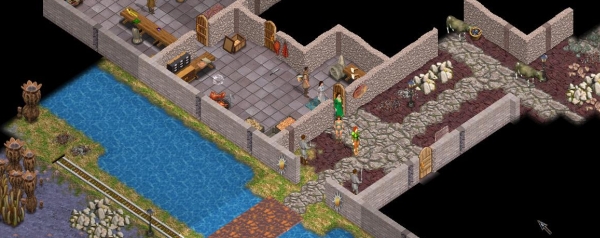Interview: Jeff Vogel On Bundles, Graphics And Pessimism
Enter His Spiderweb
Jeff Vogel is the man behind Spiderweb Software, the studio that recently celebrated its twentieth anniversary of creating rich, deep RPGs. As a week-long Humble sale draws to a close tomorrow, we dragged Jeff away from writing content for Avadon 2 to talk about the amazing success of the sale and how it will put his kids through college, the changing nature of selling indie games over the years, and how feedback affects the RPGs he creates. You might also be surprised to learn whether he'd opt for flashier graphics if he could.
RPS: At the time of writing, you've sold over 33,000 copies of your bundle, raising nearly $155,000, with two days to go. Have you ever had such a profitable week before?
Vogel: Nope. This is the record, by a wide margin. We're shocked. I honestly though it would do less than a third of that. I am hugely grateful. It makes us feel liked, and it's always great to feel liked.
RPS: Did you have any hopes in mind before it started, maybe target you were aiming for?
Vogel: I've learned over the last two decades to try not to have expectations. Things are so super unpredictable. There are so many factors and so many moving parts that go into how something will be received. That said, I always try to be cynical and pessimistic, and I though the Humble Bundle would be nice and pleasant and a good bonus and not set the world on fire. I can't remember when I've been more surprised.
RPS: Have you been able to look away from the Humble site and the live numbers rolling in?
Vogel: I let myself look twice a day. Once when I get up, Once when I go to bed. I've developed a lot of rules and guidelines over the years to stay sane. One of them is that I exercise iron discipline and let myself know how my games are selling as little as possible. My employees are forbidden from telling me anything about sales. It never does me any good to know how my games are doing. If the news is good, I don't feel good. If the news is bad, I feel terrible. So I have spent the Humble Bundle days doing what I always do: writing dialogue for Avadon 2: The Corruption.
RPS: That's extraordinarily disciplined! You've taken a variety of different approaches to pricing your games, with quite high fixed prices on your own website, and cheaper options on outlets like Steam. Has taking part in a pay-what-you-want sale changed how you might approach pricing things in future?
Vogel: Nope. This is how indie games (well, all computer games) are sold these days: Full price for a couple months. Then ratchet the price down fast. First 50% off, then 75% off, then bundle pricing. It's how we use every part of the buffalo. I believe that letting your game be in a bundle on the first day of release would be a colossal mistake, but not as big as never dropping the price at all. But this is key: The low prices are always for temporary sales. The low prices are never ever permanent. That is how you maintain the value of your back catalog.
RPS: Spiderweb has been going an for amazing twenty years, and clearly has a large following of dedicated fans. But from my perspective, the last couple of years have seen perceptions change from a quite niche specialist developer, to a broader appeal. Why do you think this is happening now? Is it simply reaching new audiences through online retailers and devices like tablets, or do you think there's also a new appetite for meaty RPGs out there?
Vogel: I think the demand has always been there, but I just didn't have a big enough microphone. Single player story-driven RPGs are one of the oldest, most beloved, evergreen computer game genres. The biggest frustration for me, over the years, is that I've known there are hordes out there who wanted to at least try my games, but I didn't have the PR muscle to reach them. Steam changed everything for everyone. It certainly changed my life. The Humble Bundle is also fantastic, for the way it lets anyone, for a tiny price, try games and genres they would never have otherwise. That alone makes the Humble Bundle great for the industry.
RPS: You've resisted changing your game design from the top-down, relatively simple layout to the more detailed environments that appear in most contemporary RPGs. What's the reasoning behind that?
Vogel: It's an interesting question, because it makes an unstated assumption that the qualities of modern RPGs are superior. And they are. To some people. But indie games over the last years has showed us that there is a hunger for all sorts of presentations. Look at the stunning rise in popularity of more simple 8-bit graphic games over the last few years. A lot of those simple-looking games were hits!
RPS: There really wasn't the assumption that the higher fidelity games are superior! Graphically, sure, but beyond that it can make little difference in the genre.
Vogel: There is room for a lot of different art styles in the industry, so I go with the thing that I personally like and that I can afford.
RPS: Are there advantages you find to the presentation you use, beyond whatever money it might save. Do you think it affords you or the player advantages too?
Vogel: To tell the truth, outside of a clean appearance, I don't think there's a lot of advantages. I mean, it looks good for what it is. Don't get me wrong... I am not immune to the appeal of nice graphics. If I had a AAA budget and team and the ability to make something super-shiny, I would totally be into that. It's just not really an option for me. So I just like to appreciate the nice things about my work without deluding myself into thinking it's something it's plainly not.
Also, one key point. I could blow every penny I own, and I would never be able to match Skyrim or Dragon Age in appearance. I've seen so many people play this game before. They have a simple indie game, work like dogs and spend piles of cash to make it look as good as it can, and then get instantly dismissed as "Not as good looking as Skyrim." It's just not a game I choose to play. I really need to get a real sound designer, though.
RPS: How would you say the immediacy of customer feedback has affected your experience releasing games? Presumably twenty years ago, when releasing an epic RPG, it was a very different process.
Vogel: I pay huge attention to player feedback, but for the next game. While I am writing a game, I only listen to feedback from a small, elite cadre of friends, testers, and wife. When you're in the weeds, I think it is very important to limit the number of voices in your head. But once the game is done, it's open season!
RPS: Has feedback affected the development of Avadon 2 in a way that previous series woudn't have received? Or do you blank it out and focus on the project you want to create?
Vogel: Oh, I listened to feedback a lot for Avadon 2. People thought Avadon's beginning was too dry and uninteresting, and they were right. They wanted male and female icons for each character class. They wanted the interesting action to start sooner. They wanted better graphics. (And we did spend quite a bit of money putting a lot of new art into Avadon 2.) They wanted more decisions to make and different endings to experience. And I've been trying to answer all of those criticisms, and, honestly, I'm doing pretty good. But then there will be many complaints about Avadon 2. And I'll work those into Avadon 3.
RPS: Talking of Avadon 2, what exciting tidbits of information can you give us about it? What should we most be looking forward to?
Vogel: It's got a really cool story, and the tale is intertwined into the gameplay much more smoothly. I've really tried to make every major quest and dungeon have some hook or unique element or new thing for more variety and strategy and fun. It's taken a lot more time to write Avadon 2 (2 years, a personal record), and there's a lot of fun stuff in it. I'm really proud of it, and I can't wait to see what people think.
Here's the thing about the Avadon games. I know some people think they're too different from what I've done before. But when the more complex fights start, Avadon is the game I've written that I personally enjoy playing most. I honestly find it to be a lot of fun.
RPS: In light of the financial success of the bundle, will that have any effect on the development of future games, perhaps open new opportunities, or simply mean less worry for the next utility bill?
Vogel: I don't think it will make a big difference. I'm getting older and slower and a little burned out, so I'll keep writing games, just not at the frenetic pace I have been since the mid-nineties. All the money will probably go to buying college for my kids. Which is totally awesome, but it won't change my life so much in the day to day.
RPS: What do you think new indies can learn from the tales of Spiderweb?
Vogel: I think that if there is anything I want people to learn from my example, it's that there are a lot of ways to be in this business, a lot of way to fund, design, and create a game. People always have their ideas about how games should be made, and I ignore them. I do my own thing. I made up my own process, and I encourage others to do the same.
For example, if I have a really nice icon of a wolf, I'll use that for four games. Why shouldn't I? It still looks nice! This sort of reuse is anathema these days, and I think that's a shame. I'm a thrifty guy. I do what it takes to get the thing over the finish line, on time and under budget. Any suggestion that interferes with that is discarded without mercy.
RPS: Thanks for your time.
Vogel: Oh, and one more time, so many thanks to Humble Bundle and to all the people who supported it. I feel truly honored.





